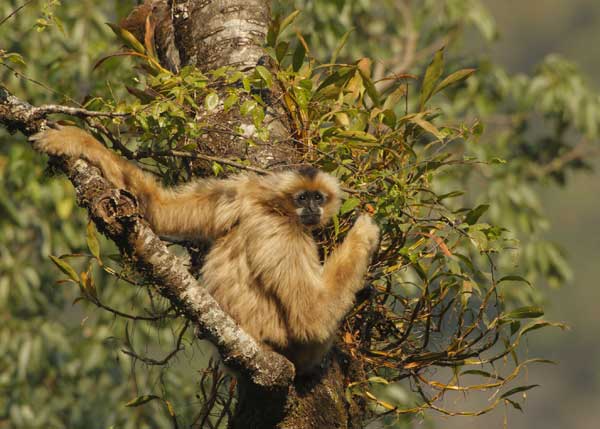Last of the gibbons
 |
|
A female western black-crested gibbon feeds in the canopy of a moist evergreen broadleaf forest in Yunnan province. Zhao Chao / for China Daily |
The world's gibbon population is facing the threat of extinction. Chen Liang finds out what is being done to preserve what's left of the population in China.
Western black-crested gibbon is more endangered than the giant panda, even though it is the country's most populous gibbon. With a global population of 1,100-1,400, it was listed as critically endangered on the International Union for Conservation's Red List. The gibbon, Nomascus concolor, has a discontinuous distribution across southwestern China, northwestern Laos and northern Vietnam. Yunnan province has the biggest population, with nearly 80 percent of the primate species living in moist evergreen broadleaf forests on the Ailao Mountains and Wuliang Mountains.
Fortunately, their habitats on the mountain ranges are by and large unspoiled.
"Placing 1,000-1,300 western black-crested gibbons and their habitats under protection has become the country's biggest hope to keep gibbons singing in the wild," says Long Yongcheng, the chief scientist with The Nature Conservancy's China Office. He was speaking at the launch ceremony for a trekking event on the Ailao Mountains, held recently in Kunming.
Gibbons' singing was often described in ancient Chinese poems, the biologist said, as they could be found as far north as today's Gansu and Shanxi provinces. "But now, few people know the existence of gibbons in the country," he says. "Fewer have the luck to listen to their duets in the wild."
That is because the country's six gibbon species can only be found in Yunnan and Hainan provinces, and the Guangxi Zhuang autonomous region. The total population stands at about 1,500.
Of them, a small area between northern Vietnam and Guangxi is the only habitat in the world where the eastern black-crested gibbon is found. With 18 families of about 100 animals, they have been "wandering around the borders", according to Fan Pengfei, one of the country's leading gibbon researchers.
Related:
Although few participants of the recent trek on the Ailao Mountains (Ailaoshan) managed to hear the western black-crested gibbons' duets, no one seemed to regret taking part. More...


















